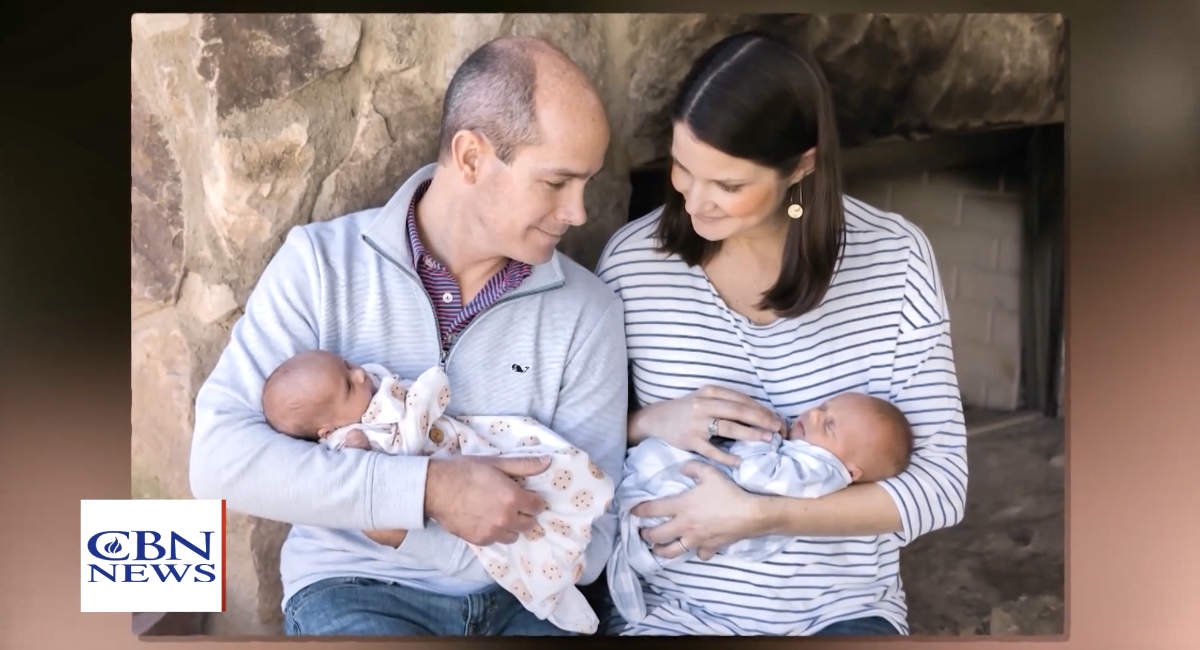Rodney and Mary Leah Miller were hoping to start a family, but after 10 years and countless negative pregnancy tests, they turned to artificial reproductive technology. That failed too. Then, they adopted someone else’s embryos, left over from another couple’s in vitro fertilization (IVF) procedures, and welcomed twins.
“Attempt after attempt, negative pregnancy test after negative pregnancy test, you begin to wonder, will this ever happen for us,” Mary Leah told CBN News.
Now, they’re expecting another set of twins, also adopted as embryos.
Failed IVF leads to discovery of embryo adoption
In May 2020, after several rounds of IVF failed, friends told them about embryo adoption. Though the IVF process is fraught with ethical concerns, embryo adoption — also somewhat controversial — has become a way for some pro-life couples to build a family while saving the lives of human beings who might otherwise be discarded or indefinitely frozen.
“We’ll never forget,” said Rodney. “They were very familiar with our journey and had some friends who had just had a daughter via embryo adoption. We had a sense of hope that we hadn’t experienced in a long time, and we had not given up hope during our journey. We both just had a peace about us and were very confident that this is how the Lord was going to start our family.”
A first attempt ended in miscarriage, but after a second embryo transfer, the couple learned they were expecting twins. Dalton and Mary Elizabeth were born a year and a half ago after being frozen for 10 years.
Mary Leah said their births brought “joy and gratitude.” They are currently expecting a second set of twins through embryo adoption.
Moral and ethical issues of IVF
According to Snowflakes Embryo Adoption Program, a division of Nightlight Christian Adoptions, it is estimated that there are over 1.5 million human embryos currently frozen in the United States alone. That’s up from the estimated one million in 2017.
Each year, IVF is carried out 2.5 million times annually around the world, but each year, only 500,000 babies are born from the IVF process, according to research published by Reproductive Biomedicine Online. That means that each year if just one single embryo is created during each IVF cycle (the average is seven), at least 80% — at least two million — of the human beings created through IVF either die during the process, are frozen indefinitely, or are destroyed.
IVF kills preborn children at a higher rate than abortion. Some couples, not wanting to destroy the children they have created through IVF and had wanted so badly, opt to place their embryos for adoption. Over 2,000 families have donated their “leftover embryos” to Snowflakes since the program launched in 1997.
The ethical concerns surrounding IVF include the purposeful destruction of millions of children, weeded out for being genetically imperfect, the ‘wrong’ gender, or for being extra. But there are other concerns as well. IVF has been linked to physical effects for the children who survive to birth — including a risk of low birth weight, premature birth, hospital admission, perinatal mortality, cerebral palsy, and a “significantly” increased risk of birth defects compared to children conceived naturally. They are also at higher risk for high blood pressure, cardiovascular problems, and cancer; girls conceived through IVF sometimes have advanced bone age and hormonal imbalances during puberty.
“We ourselves understand the moral and ethical issues that believers face,” Rodney said about the time they went through the IVF process. “We faced them and made very difficult decisions with our very first specialist that we spoke with on the number of embryos that we were willing to fertilize and that we wouldn’t be discarding any.”
Emotional effects of IVF
IVF can also come with an emotional toll, not only for the adults but for the children.
Claire, who was born through IVF to her biological parents, explained that she always knew her parents loved her and wanted her, but that learning about her conception caused her emotional pain. She said after 12 years of marriage and eight rounds of IVF, “my parents developed the idea that they deserved to have a baby, and it didn’t matter how much it cost, how many times it took, or how many died in the process. … And since they deserved a child, I was their property to be controlled, not a person or a gift to be treasured.” She also noted:
Why did the knowledge that I was conceived by IVF after 8 rounds make me feel so much like a lab rat? Why did it tarnish the feeling of being a miracle? For 21 years I had been led to believe that the only thing that changed when I was conceived was prayer and a miracle. My parents had gotten a lot of people to pray, and I was born… But they also spent an unbelievable sum on IVF… and kept going beyond reason, it seems to me.
In addition to sometimes feeling like a consumer product, children conceived through IVF have an increased risk of ADHD, autism, and depression.
A “rescue operation”?
Embryo adoption seeks to save children conceived in IVF from being destroyed or indefinitely frozen, and in the U.S., the annual donated embryo transfer rate more than tripled from 2004 to 2019.
The practice has become increasingly popular among Christians like the Millers, who view it as life-saving. Dr. Paul and Susan Lim also adopted an embryo and referred to the process as a “rescue operation.”
Dr. Lim explained to The New York Times, “These children are being abandoned in a frozen state. If they don’t get adopted, they’re dead.”







